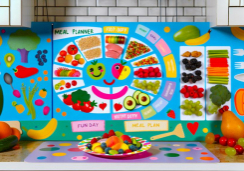Why Is Strategic Meal Planning Key for Diabetics?
You might not be aware, but the process of digesting and metabolizing your food can significantly influence your body's insulin response. As someone living with diabetes, you're tasked with the critical challenge of maintaining stable blood glucose levels, and strategic meal planning emerges as a vital tool in your arsenal.
It's not just about what you eat, but also how and when you plan your meals that can make a world of difference in controlling your condition. By mastering the art of meal planning, you're able to align your dietary intake with your body's energy needs, reducing the risk of blood sugar spikes and crashes.
You'll find that with a well-crafted meal plan, you can enjoy a variety of foods while keeping your health on track. Stick around to uncover how you can transform your daily eating habits into a powerful strategy for managing your diabetes, without feeling restricted or overwhelmed by dietary limitations.
Balancing Blood Sugar Levels
Navigating the complexities of carbohydrate consumption is fundamental for diabetics aiming to maintain stable blood sugar levels. Carbohydrates have a direct impact on your blood sugar, and understanding their effects is key. You need to monitor not only the types but also the amount of food you consume, particularly carbohydrates. This precision ensures you're keeping your blood sugar within target ranges.
Creating a diabetes meal plan with a professional can be your cornerstone for control. A dietitian or diabetes educator offers personalized guidance, helping you choose an appropriate carbohydrate intake that aligns with your lifestyle and health goals. They'll also assist in teaching you to estimate carbs in various foods, an essential skill for managing your blood glucose effectively.
Remember, it's not just what food you eat, but also when you eat it. Timing your meals and snacks helps in regulating your blood sugar throughout the day. With a structured and healthy meal plan, you're less likely to encounter unexpected spikes or drops in your blood glucose levels.
In essence, a well-crafted diabetes meal plan is a balancing act—tailored to your body's needs, it supports the delicate equilibrium of blood sugar control.
Personalizing Nutritional Needs
While a well-crafted diabetes meal plan provides a foundation for blood sugar control, personalizing your nutritional needs is the key to tailoring this strategy to your unique lifestyle and health objectives. Customizing your approach to diabetes management ensures that your dietary habits align with your individual preferences, cultural considerations, and specific health goals.
When personalizing nutritional needs, it's crucial to incorporate:
- Individual taste preferences to maintain enjoyment and consistency in your diet.
- Cultural dietary patterns to respect traditions and facilitate adherence.
- Physical activity levels to adjust for energy needs and blood sugar fluctuations.
- Medication regimen to ensure dietary choices support your treatment plan.
- Health goals to focus on outcomes that matter to you, like weight management or heart health.
To create a personalized meal plan that's both effective and satisfying, make sure to consult a registered dietitian nutritionist (RDN) or a certified diabetes educator. They can help you understand the principles of the Plate Method, endorsed by the American Diabetes Association, which emphasizes a balance of non-starchy vegetables, lean protein, and whole grains.
Simplifying Grocery Shopping
To streamline your grocery shopping process, start by creating a detailed list that focuses on fresh produce, whole grains, and lean proteins, which are essential for a balanced diabetic diet. As you prepare your meal plan for diabetes, it's crucial to select food groups that support blood sugar control and overall health.
People with Diabetes must be vigilant about their food choices. Prioritize fruits and vegetables, as they provide vital nutrients and fiber. When it comes to grains, opt for whole grain products over refined ones—they have more nutrients and a lower impact on blood sugar levels. Lean protein sources, including poultry, fish, and beans, are also key components of a healthy diabetic meal plan.
It's important to estimate portion sizes and serving sizes to avoid high amounts of carbs, especially from foods that are higher in carbs. Be mindful of added sugars, which can quickly spike blood glucose levels. Utilize food-tracking apps and nutritional websites to help you make informed decisions when it comes to what you place in your cart.
Ultimately, shopping with a clear plan aligns with your dietary needs, making your path to managing diabetes more straightforward and less stressful.
Reducing Diet-Related Stress
Having established a structured approach to grocery shopping, let's focus on minimizing diet-related stress, an important aspect of managing diabetes with confidence and ease.
Creating a meal plan tailored to your diabetes can be a powerful tool to keep your blood sugar within your target range. It's crucial to create a healthy balance, especially with foods that are higher in carbs, which can impact your blood sugar levels more significantly.
When you plan your meals ahead of time, you make it easier to manage your diabetes effectively. Here are some strategies to reduce diet-related stress:
- Utilize technology and apps for meal planning and tracking nutritional intake.
- Include a variety of foods to prevent boredom and enhance meal enjoyment.
- Allow for flexibility in your meal plan to accommodate spontaneous events.
- Be sure to consult with healthcare professionals to personalize your meal planning.
- Integrate mindful eating practices and moderate snacking to maintain a positive relationship with food.
Encouraging Healthy Eating Habits
Incorporating nonstarchy vegetables into your daily meals is a key step in fostering healthy eating habits as a diabetic. By planning your meals with a focus on vegetables like green beans, you're not only filling up on essential nutrients but also managing your blood sugar levels effectively. Make sure half of your meal consists of these nutrient-dense foods, which will leave less room on your plate for foods that are higher in carbs and could spike your glucose levels.
When you plan your food intake, consider the amount of each food group. Serving Size is crucial, especially for items higher in carbs. For instance, while brown rice is a whole grain and a better choice than white rice, it's still important to measure out a proper serving to avoid overconsumption.
Frequently Asked Questions
Why Is Meal Planning Important in Diabetes?
You'll maintain blood sugar control by mastering macronutrient balance, portion sizes, and the glycemic index. Nutritional education helps with carb counting and selecting healthy snacks, optimizing your eating schedule, and moderating insulin response.
What Is the Most Effective Meal Planning Strategy for Managing Diabetes?
You'll manage diabetes effectively by counting carbs, considering the glycemic index, controlling portions, balancing macronutrients, timing nutrients, adjusting insulin, monitoring blood sugar, adding food variety, timing meals, and respecting personal preferences.
Why Is Having a Plan to Care for Diabetes Important?
Having a diabetes care plan ensures you're monitoring glucose, counting carbs, and controlling blood sugar. It involves insulin management, lifestyle changes, exercise, medication adherence, stress management, and leveraging support networks for optimal health.
What Are the Major Dietary Strategies Used for Diabetes?
You'll manage diabetes effectively by carbohydrate counting, understanding the glycemic index, practicing portion control, timing nutrients, increasing fiber intake, using sugar substitutes, balancing macronutrients, choosing anti-inflammatory foods, and monitoring blood sugar.
Conclusion
In conclusion, as a diabetic, strategic meal planning is your cornerstone for stability. It tailors to your unique nutritional needs, streamlines your shopping, and alleviates mealtime anxiety.
By focusing on portion sizes and carb control, you'll keep your blood sugar balanced. Embrace the process – it fosters healthier choices and becomes a natural part of managing your diabetes with confidence.
Remember, each meal is a step toward better health, and you're in charge of that journey.










